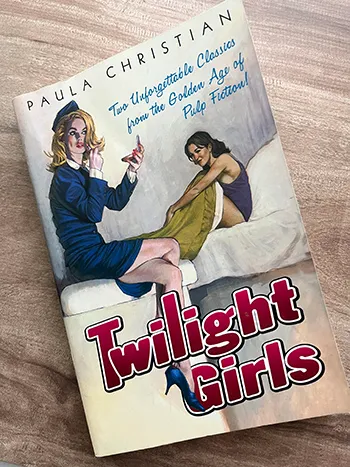
TWILIGHT GIRLS
Paula Christian
© 2003 Kensington Publishing Corp.
$15.00
282 pages
Content warning: Sexual harassment, sexual assault, incest, racism
Twilight Girls is written by Paula Christian (real name: Yvonne MacManus) and hews to her real life closely. Like the main character, MacManus is Mexican but raised in the States and had a failed marriage she got into in her teens and out of in her early twenties, then a career as a stewardess – in which, with the help of other stewardesses, she learns more about going down than going up. The main character's name is Val MacGregor and goes by Mac (similar to MacManus).
As someone who's seen many a puffy-eyed flight attendant being verbally abused by a rowdy passenger, I've never considered how, a single generation earlier, this could have been a type of freedom impossible anywhere else. Like being shoved into a metal tube and sent 30,000 feet in the air, it's a strange type of liberty – something impossible a few decades before but simultaneously so degrading that it's difficult to appreciate.
More than the (barely there) romance, this is a story of what it was like to be a woman existing in this world of torturous sexism for a thin scrap of autonomy. Watching Val navigate was like watching a bullfighter: she swerves gracefully between assault and harassment, her parries witty and her comportment unperturbed – until she's cornered and trampled into a bloody heap over and over and over again.
Within the first few pages, she's harassed by her coworker, who describes all the sexual things he'd like to do to her – in public, in front of all of their passengers, at an airport. Then a pilot pinches her, then another pilot grabs her, pulls her bodily into his lap and bites her ear. All of this she laughs off while still picking up weeping vomit bags and helping the crew navigate a hurricane. These affronts continue throughout the book; some Val is able to extricate herself from and others she isn't.
She's also very much alone. The only woman in power is the wife of the couple who owns the airlines, and the only equal opportunity she's interested in is equal-opportunity predation, which she makes clear in her late-night summons to Val.
Despite constant abuse, the only time Val is ruffled is when she's kissed by Toni, a fellow stewardess with whom she shares a room, and she realizes, for the first time, that she wants more.
Val tries to tamp down her budding Sapphic feelings by drowning herself in the cascade of thirsty male suitors. Her boyfriend proposes marriage, and a married pilot professes his love, among dozens of others. The most heartbreaking is an older man who initially expresses patronly interest and with whom she seems to have a genuine rapport – until he follows her to her room, where he takes out on Val the self-loathing he feels over his own desires with brutal physicality. It's the end of the closest thing Val has to friendship.
Eventually, Val decides to leave Miami and go back to her home in New York and to Toni.
But falling into a relationship isn't the happy ending it pretends to be. The happy ending here is not when Val goes back to Toni; it's when she's in a Miami club with Don, her would-be fiancé. They realize it's a Gay bar, and Val, instead of leaving with Don and accepting his proposal, stays. Don leaves. Val dances with another woman in public, among her people. For the first time in her flight-oriented personal and professional life, she chooses to stay.
While the book calls itself "Lesbian pulp," the novel could more accurately be called a bildungsroman. Val is dealt a tragic hand: her life growing up was filled with abuse, she escaped a bad marriage, and by the skin of her teeth, she managed to land a stewardess job. She's an incredibly strong character, but she dismisses everything she's accomplished and fails to give herself any gentleness for the way she has to cope in a poisonous environment.
MacManus wrote much of herself into this book, and this self-condemnation was part of it. In The Ladder, MacManus wrote that she wished psychiatrists would invent a cure for homosexuality. She was vilified for this, but from the relative comfort of the present day, it's hard to have the same animus. At its heart, that was a wish for an easier life. It was simpler for MacManus to imagine she could change herself than that society would change around her. Like the book, it's tragic in a way that the main character may never realize. I hope MacManus found her Toni.

